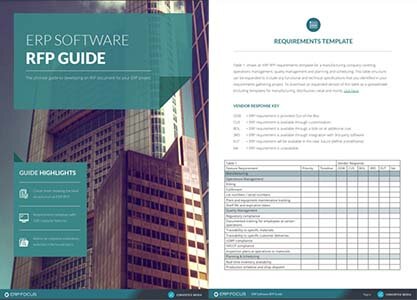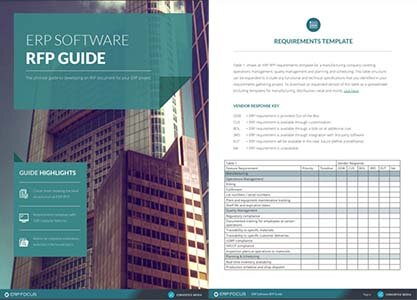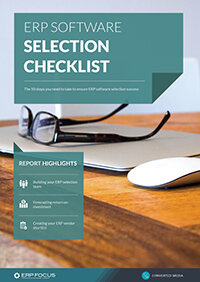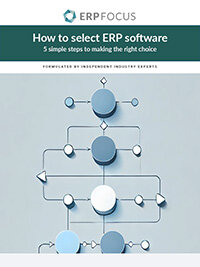ERP RFQ, RFI and RFP: Mastering those vendor selection acronyms
When selecting an ERP vendor, understanding the significance of ERP acronyms like RFI, RFP, and RFQ is crucial. These documents play a pivotal role in the process. Involving someone from procurement in creating effective documents is crucial, regardless of your ERP team structure.
Understanding RFQ, RFI, and RFP
Before diving into the intricacies of each document, let's define what RFQ, RFI, and RFP mean and their roles in the vendor selection process.
Contents:
What is an RFQ?
An RFQ, or Request for Quotation, is a document used to solicit price quotations from vendors for specific products or services. It's typically used when the requirements are well-defined and the main decision factor is price.
What is an RFI?
An RFI, or Request for Information, is a preliminary document used to gather general information about potential vendors and their offerings. It helps to narrow down the list of vendors before moving on to more detailed requests.
What is an RFP?
An RFP, or Request for Proposal, is a comprehensive document that outlines the project requirements and solicits detailed proposals from vendors. It includes information about the project's scope, objectives, and evaluation criteria.
Key Differences Between RFQ, RFI, and RFP
Understanding the key differences between RFQ, RFI, and RFP is essential for effectively utilizing each in your procurement process. Each serves a distinct purpose and is used at different stages of vendor selection.
When to Use RFQ, RFI, and RFP
Knowing when to use each document is crucial. An RFQ is best used when the specifications are clear and price is the primary consideration. An RFI is suitable for gathering preliminary information to shortlist vendors. An RFP is ideal for obtaining detailed proposals when the project scope and requirements are well-defined.
ERP Request For Information (RFI)
An RFI offers key details about an ERP vendor. It's like a business bio, sharing who they are and their values. Reading between the lines is key to grasping both what's mentioned and what's not. Every ERP vendor wishes to put their best foot forward, so to avoid being misleading, vendors often refrain from giving a direct "no" to your queries.
For example, suppose your RFI inquires about their ISO certification status. In that case, responses can vary from a clear "Yes, we've been certified for six years," to a more optimistic "We plan to be certified by September of this year," or a vague "We have a team working on certification preparation." While some might elaborate on their non-ISO approach, outright negative responses are uncommon, even to yes/no questions.
Tips for writing comprehensive RFIs: A well-crafted RFI should provide enough information to help vendors understand your needs while allowing you to gather essential details about their capabilities and offerings.
GET ERP RESEARCH & KNOWLEDGE RIGHT TO YOUR INBOX
Covering the key issues faced by businesses selecting and implementing ERP.
ERP Request For Proposal (RFP)
After reviewing RFIs from ERP vendors, identify front runners aligned with your needs. Investigate and narrow down these top choices for your ERP vendor shortlist, advancing them to the next evaluation phase with an RFP. The RFP is structured around the list of several hundred items assembled during ERP requirements gathering.
ERP Software RFP Guide: ensure your ERP RFP reflects the needs of your business
Once vendors have the RFP in hand, serious conversations ensue, as vendors seek to understand the requirements better. Beware of an ERP vendor who is not familiar with any of the issues on your 'hot' list; they probably do not have any hands-on experience with your set of problems.
Best practices for creating RFPs: When writing an RFP, it's important to include detailed information about the project, set clear expectations, and outline the evaluation criteria to ensure you receive comprehensive and relevant proposals.
ERP Request For Quote (RFQ)
From the RFPs, you will assemble a final list of two to five candidates. At that point, you will issue an RFQ – request for quote – in which each ERP vendor specifies all of the financial conditions to provide the proposed solution, including initial licensing costs, annual maintenance costs, payment terms, etc. Be courteous to your vendors; if you have no intention of selecting them under any circumstances, do not waste their time by asking them to prepare an RFQ for a complex ERP solution.
Steps for crafting effective RFQs: Creating an effective RFQ involves clearly defining the requirements, setting evaluation criteria, and soliciting detailed price quotations from vendors.
Evaluating vendor responses
Once you've received responses to your RFQ, RFI, or RFP, it's time to evaluate them. This involves comparing the responses against your criteria and conducting follow-up discussions or negotiations as needed.
Common mistakes to avoid
Avoid common pitfalls such as vague requirements, unrealistic timelines, and not engaging stakeholders in the vendor selection process.
During the ERP software selection process, numerous opinions will contribute a plethora of insights. Utilizing the written records gathered from RFIs, RFPs, and RFQs will prove invaluable in maintaining a fact-based approach throughout the process.
Free white paper

ERP Software RFP Guide & Template
The comprehensive guide to developing an RFP document for your ERP project

Featured white papers
-

60-Step ERP Selection Checklist
Get the comprehensive checklist for your ERP selection project
Download -

How to Select ERP
Learn to select your ERP in 5 easy steps by following our expert's advice
Download -

ERP Software RFP Guide & Template
The comprehensive guide to developing an RFP document for your ERP project
Download
Related articles
-

Top free ERP and open source systems (plus hidden costs)
When it comes to free ERP software, it pays to remind yourself of the old adage ‘there ain’t no s...
-

CMMC Compliance: What Aerospace and Defense Manufacturers Need to Know
Key insights on CMMC compliance, deadlines, and securing DoD contracts with CMMC 2.0 certificatio...
-

A complete ERP RFP template & guide (includes free template)
All you need to know construct a foolproof ERP RFP, including a customizable template

